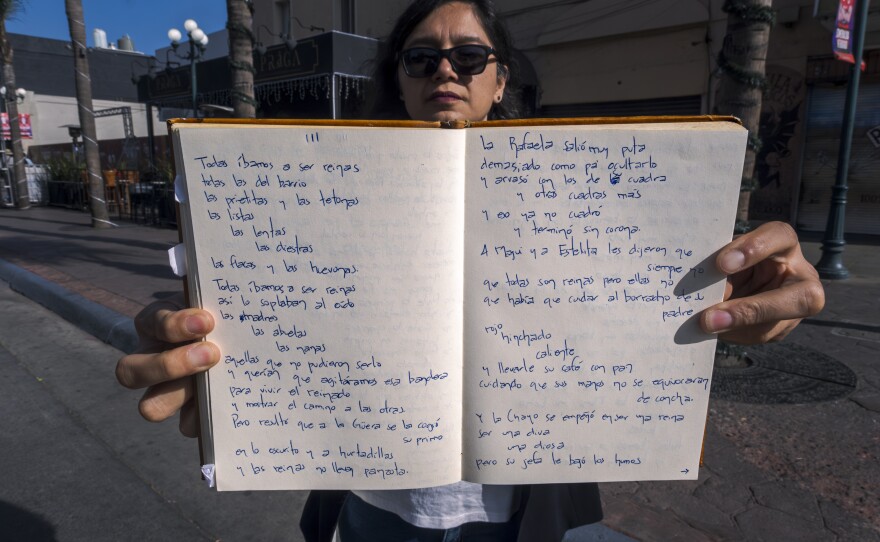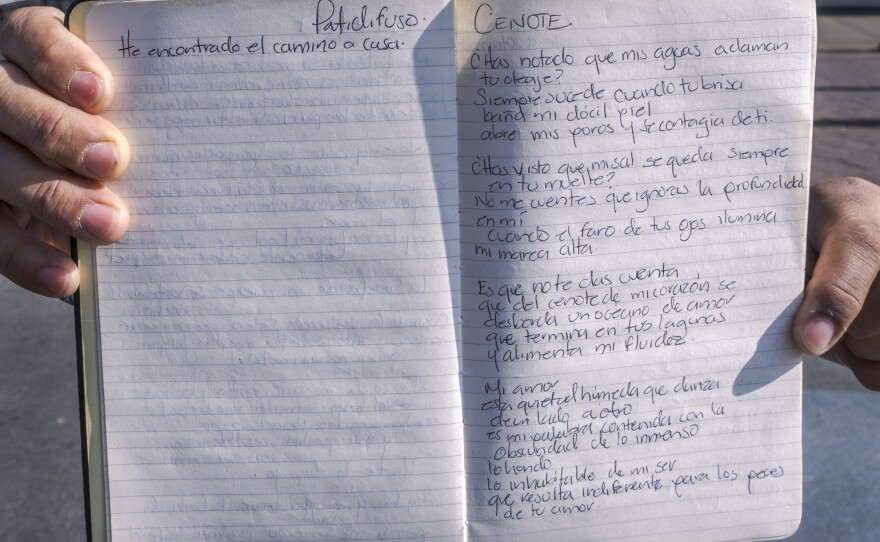Tijuana's creative community is thriving through poetry and a group of local poets is leaving its mark on Mexico's second-largest city.
Sofía Favela Magro stands on Avenida Revolución reading from her untitled poem:

“We are all going to be queens,” she recited, “all of us in the barrio. The dark-skinned and the busty, the smart ones, the slow ones, the right-handed ones.”
Her husband, Hugo Velos, also reads his poem titled, "Cenote." He named the poem after Mexico’s iconic sinkholes.

“My love,” he read, “this wet stillness that dances from side to side.”
Cenotes hold special significance for Mexicans, particularly for the Indigenous communities. The title reflects the depth of longing expressed in his poem.
At a holiday fair on Tijuana’s Avenida Revolución, now called Centro Histórico de Tijuana, a Christmas tree and decorations frame a stage near where the poets recite their work.
Velos’ poem laments an unacknowledged longing for love:
No me cuentes que ignoras la profundidad
en mí
Cuando el faro de tus ojos ilumina
mi marca alta
Don't tell me that you ignore the depth
in me
When the lighthouse of your eyes illuminates
my high mark
Meanwhile, Magro’s stanza reflects on the struggles of her community:
La Maru muy ruda
la Meli muy mensa
la Miri muy tensa
todas con ganas de salir de sus casas
por la puerta grande
Maru is very rude
Meli is very stupid
Miri is very tense
all of them wanting to leave their houses
through the big front door
The couple began a semi-regular poetry reading six years ago at Magro’s sister’s cafe, the Selfie Coffee and Bar in Tijuana, as a way to express themselves. They say they need to talk about things differently.
The gatherings are called Noche de Poetas and have since grown. The group is now preparing to publish its first anthology.
"So this is an opportunity to do so, and we also believe that it is the next step in the evolution of our project," Magro said.
Dr. Valeria Valencia Zamudio, a professor of applied linguistics at the Universidad Autónoma de Baja California, said Tijuana has a strong historical connection to poetry.
“When I was in high school, for example, there was this radio program in which a lot of young people used to go to the radio station and just read either our poems or the poems that we liked best,” Zamudio shared.
She believes the Noche de Poetas anthology could be a huge hit, following in the footsteps of “Siete poetas jóvenes de Tijuana,” originally published in 1974 and republished in 2020.
“It's very brave. It takes a lot of courage to put yourself out there because you don't know what other people are going to think,” said Zamudio.
Magro said creating a safe space is a big part of Noche de Poetas’ mission.
“Noche de Poetas is a safe space, a space of freedom to be able to share what they want, whether it's their own writing or someone else's writing, or simply the vulnerability of being able to connect with other letters is not something you can do anywhere, even sometimes with your friends.”
If you've got a poem to share, send it to Noche de Poetas on Instagram. Submissions are open until Jan. 21.





